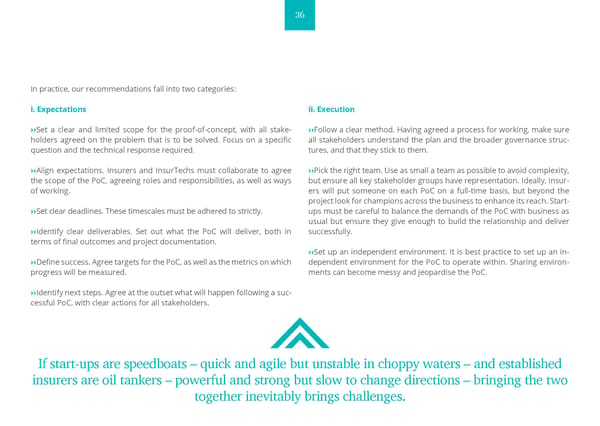36 In practice, our recommendations fall into two categories: i. Expectations ii. Execution ››Set a clear and limited scope for the proof-of-concept, with all stake- ››Follow a clear method. Having agreed a process for working, make sure holders agreed on the problem that is to be solved. Focus on a specific all stakeholders understand the plan and the broader governance struc- question and the technical response required. tures, and that they stick to them. ››Align expectations. Insurers and InsurTechs must collaborate to agree ››Pick the right team. Use as small a team as possible to avoid complexity, the scope of the PoC, agreeing roles and responsibilities, as well as ways but ensure all key stakeholder groups have representation. Ideally, insur- of working. ers will put someone on each PoC on a full-time basis, but beyond the project look for champions across the business to enhance its reach. Start- ››Set clear deadlines. These timescales must be adhered to strictly. ups must be careful to balance the demands of the PoC with business as usual but ensure they give enough to build the relationship and deliver ››Identify clear deliverables. Set out what the PoC will deliver, both in successfully. terms of final outcomes and project documentation. ››Set up an independent environment. It is best practice to set up an in- ››Define success. Agree targets for the PoC, as well as the metrics on which dependent environment for the PoC to operate within. Sharing environ- progress will be measured. ments can become messy and jeopardise the PoC. ››Identify next steps. Agree at the outset what will happen following a suc- cessful PoC, with clear actions for all stakeholders. If start-ups are speedboats – quick and agile but unstable in choppy waters – and established insurers are oil tankers – powerful and strong but slow to change directions – bringing the two together inevitably brings challenges.
 PwC & Startupbootcamp InsurTech: READY FOR TAKE OFF Page 35 Page 37
PwC & Startupbootcamp InsurTech: READY FOR TAKE OFF Page 35 Page 37